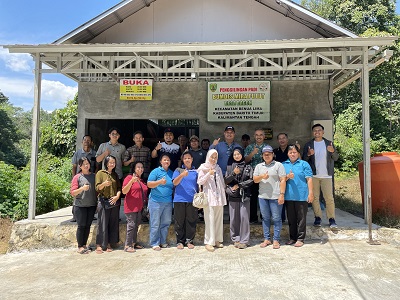IPB University and PT Adaro Indonesia Initiate Efforts for the Development of Rice Commodities in Kalimantan

IPB University, through the Directorate of Agromaritime Community Development, collaborated with PT Adaro Indonesia through the Kedaireka Matching Fund Program scheme in 2023. The implementation of this program is spread across nine villages and three districts, assisted by PT Adaro Indonesia’s partners. One of the innovations that will be applied is the innovation of rice commodity development in three assisted villages, namely, Liyu Village, Balangan Regency, Pangelak Village, East Barito Regency and Bagok Village, East Barito Regency.
In preparation for the implementation of the program, IPB University brought a team of experts from the Faculty of Agriculture, Dr M Rahmad Suhartanto, to carry out a survey of field conditions. Focus group discussions (FGDs) were also conducted and attended by PT Adaro Indonesia’s partners, village governments, village-owned enterprises (BUMDes), and local farmer groups.
“This FGD activity is our first step to exploring data and information in the field. We hope that farmers can provide information and explain how the implementation of local rice cultivation practices has contributed to the problems that are happening. Thus, we can formulate the right program to be applied to the target villages,” said Dr Rahmad Suhartanto at the end of July.
Rice is a potential food commodity to be developed in Kalimantan Province. However, in the process of implementing cultivation, some farmers still face various problems, such as a lack of fertilizer availability, pest and disease attacks, and low rice productivity.
Based on the results of discussions with farmers, there are allegations that the cause of low rice production is pyrite poisoning (FeS2). Therefore, the IPB University team also took soil samples at several points on the experimental land for further analysis.
“This soil sampling activity is something that is needed by the community. By knowing the elements contained in the soil, we hope to obtain accurate information. Therefore, we ask for help and cooperation with IPB University,” said Khairani, Corporate Social Responsibility of PT Adaro Indonesia.
In addition to the cultivation aspect, postharvest management is also an important focus for developing rice commodities. The IPB University team, accompanied by PT Adaro Indonesia, had the opportunity to visit a rice mill and see the demonstration process of using its tools in Bagok Village, East Barito Regency. According to Dr Rahmad, the rice milling facilities are quite good and complete.
“In the future, we hope that the rice produced by the community will not only be able to meet daily consumption but can also be sold outside the region,” he concluded. (*/Rz) (IAAS/MZS)



